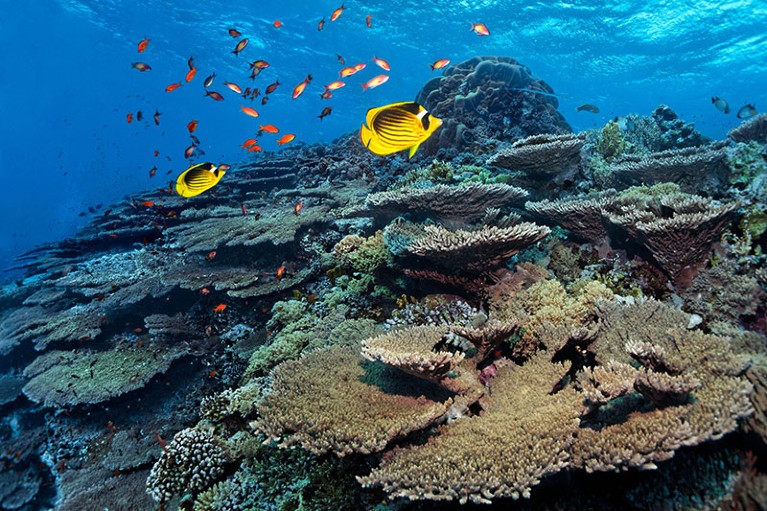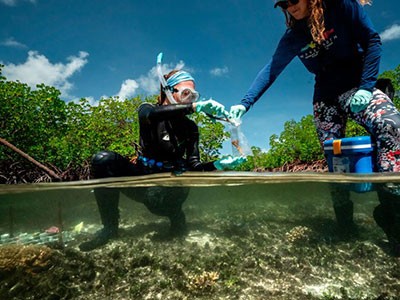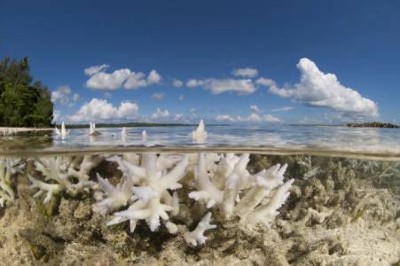
Seattle, Washington
Corals in the Caribbean have been dying off for decades — and a devastating heatwave there last summer made matters worse. Researchers are now considering something that was once unthinkable: is it time to give up on native species, and transplant hardier corals from other oceans to struggling Caribbean reefs?
It is a radical proposal that could leave the region forever changed. But it is important to explore the possibility now because the region’s reefs are running out of time, said coral geneticist Mikhail Matz in a presentation at the Society for Integrative and Comparative Biology annual meeting in Seattle, Washington, on 4 January.
Coral transplantation would take decades to study and implement, and with each passing year, the Caribbean’s bleached reefs will be at greater risk of erosion and collapse, destroying the rocky infrastructure on which the transplanted corals could take hold. “It’s an 11th-hour solution,” said Matz, who works at the University of Texas at Austin. “And it is now 11.45.”
Ecosystem in peril
Coral reefs enhance protection against coastal erosion and provide crucial shelter for young fish. But reefs in the Caribbean have been devastated by climate change, disease and pollution. By some estimates, corals in particular regions have declined by more than 80% in the past two decades. A prolonged and record-breaking heatwave last summer further raised the sense of urgency.

‘Ecological grief’ grips scientists witnessing Great Barrier Reef’s decline
“It wasn’t just that the records were broken,” says Margaret Miller, research director at Secore International, a non-profit organization focused on coral-reef restoration and based in Hilliard, Ohio. “They were blown out of the water.” There are predictions that next summer could be just as bad — or worse.
In the oceans of the Indo-Pacific region, many corals are continuing to thrive. Several coral species there are considered ‘super-recruiters’ because of how readily their larvae attach to and colonize reefs. Dominant coral species in the Caribbean, by contrast, are poor recruiters, hindering their ability to recovery from calamity1.
As a result, Matz suggests that it might be time to investigate whether transplanting these Indo-Pacific species to the Caribbean could be a way to reseed the reefs. Resilient species such as table coral (Acropora hyacinthus) could be better able to prosper in a challenging environment.
That’s an unpopular and painful proposition, says Miller — but one that she expects to be taken more seriously in the wake of last summer’s severe heatwave. “We’re all kind of shell shocked,” she says. “There will be more conversations about more radical interventions.”
Failed solution
For years, conservation groups have focused on restoring barren reefs by planting thousands of young, native corals in the hope that they would flourish. For the most part, they have not, says Carlos Prada, a coral evolutionary biologist at the University of Rhode Island in Kingston. Coral populations have continued to decline, he says: “We either do something else, or we lose the corals.”
But to bring in exotic species could spell the end of the native reef, says Miller. Reefs composed of non-native species can provide some of the ecological services of native reefs, but they will not be Caribbean reefs anymore, Miller says. She adds that it is unclear whether even the Indo-Pacific coral species could survive the pollution, heat extremes and diseases of the Caribbean. Furthermore, transplanted species could bring fresh diseases with them and could disturb the local ecology in unpredicted ways.
Matz argues that steps could be taken to reduce disease risk, such as growing the transplants in the laboratory before introducing them to the open water. As for unpredictable consequences, he proposes that initial field studies take place in areas where the introduced coral are unlikely to spread to other regions.

The ocean is hotter than ever: what happens next?
Nevertheless, such pilot studies would be anathema to current conservation approaches, and unlikely to be funded or permitted today, says Prada. The main thing to do now, he says, is to start the conversation.
Other radical ideas that might be considered in the coming year or two include CRISPR genome editing of native species to make them more heat resistant, or treatment with microorganisms that might foster disease resistance, says Miller. It will be a difficult choice: each of these ideas comes with risks to the natural ecosystem.
“How far do you go? When do we just give up?” she says. “I don’t know.”
"Idea" - Google News
January 15, 2024 at 04:18PM
https://ift.tt/nJjuPC5
Can foreign coral save a dying reef? Radical idea sparks debate - Nature.com
"Idea" - Google News
https://ift.tt/AiH4E8M
https://ift.tt/34yIxnD
Bagikan Berita Ini














0 Response to "Can foreign coral save a dying reef? Radical idea sparks debate - Nature.com"
Post a Comment